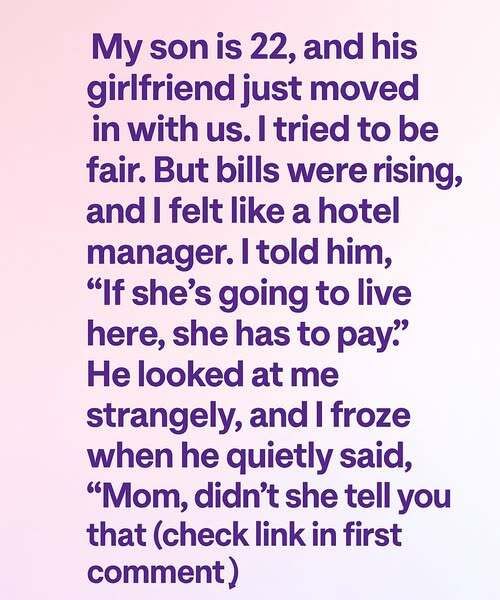When my 22-year-old son told me his girlfriend would be moving in with us, I tried to take it in stride. I reminded myself that young love needs room to breathe, that this was part of growing up — both for him and for me. After all, every parent eventually faces that moment when their child begins to build a life beyond the walls of home.
At first, everything seemed fine. I made sure they had their privacy, gave them space to cook together, and let them settle in. But as the weeks passed, little things began to nag at me. The grocery bill crept higher. The water and electricity seemed to run constantly. The laundry room was always full.
And slowly, without realizing it, I began to feel less like a mother and more like a host.
When Tension Quietly Moves In
It wasn’t anger, exactly — more of a quiet tension that started to fill the house. I’d notice a half-empty milk carton or an unwashed dish and feel a small flicker of irritation. I didn’t say anything at first, but the thoughts built up until one evening, while clearing the dinner table, I finally spoke.
“If she’s going to live here,” I said, trying to sound calm, “she needs to contribute.”
My son looked at me with an expression I didn’t quite understand — not defensive, not angry, just… surprised.
“Mom,” he said softly, “didn’t she tell you?”
I froze. The tone of his voice made my heart skip. I braced myself, uncertain of what was coming next.
He went on, “She’s been paying part of the groceries and utilities since she moved in. She just didn’t want to make it awkward.”
The Moment Truth Replaced Assumption
I stood there, speechless. Every unspoken thought I’d had over the past few weeks — every judgment, every quiet sigh of frustration — came rushing back with a sting of guilt.
I had built a story in my head, one that wasn’t true.
That night, after everyone had gone to bed, I found a small handwritten note on the kitchen counter. The paper was folded neatly, with my name written in soft, looping letters.
“Thank you for letting me stay,” it read. “I want to help more if I can. I hope I’m not a burden.”
The simple kindness of her words hit me like a wave.
Learning to See Beyond the Surface
I sat at the kitchen table for a long while, the note still in my hand. The quiet hum of the refrigerator was the only sound in the room.
I realized how quickly we can misinterpret others’ intentions — especially when we’re juggling love, pride, and a lifetime of habits. My son’s girlfriend hadn’t been trying to take advantage of our home. She’d been trying to fit in, to contribute quietly, to respect boundaries that she wasn’t sure how to cross.
And I, with all my good intentions, had let my assumptions speak louder than compassion.
Finding Family in New Forms
The next morning, I woke up early and made breakfast — eggs, toast, and fresh coffee, the kind of simple meal that always feels like home. When they came into the kitchen, I smiled and said, “I owe you both an apology.”
We talked. We laughed. The tension that had hung over the house dissolved, replaced by something lighter, warmer.
It wasn’t just about groceries or money anymore. It was about understanding. About learning that fairness isn’t measured in dollars or chores, but in patience, honesty, and grace.
When Hearts Begin to Listen
That day, I learned something I wish I’d understood years earlier: sometimes, the real growth in a family doesn’t happen during big life events — it happens in quiet moments of humility.
As parents, it’s easy to forget that our children are still learning how to balance independence with gratitude. And it’s just as easy for us to forget that we, too, are still learning — how to let go, how to trust, and how to see love in new forms.
Now, when I watch my son and his girlfriend cooking dinner together or laughing over a shared joke, I no longer see “guests” in my home. I see two young people trying to build their own story — and I feel grateful to be part of it.
In the end, understanding isn’t about who pays the bills or who does the dishes. It’s about listening — truly listening — before deciding what’s fair.
Because sometimes, the greatest lessons don’t come from experience or age, but from the quiet honesty of the next generation.
